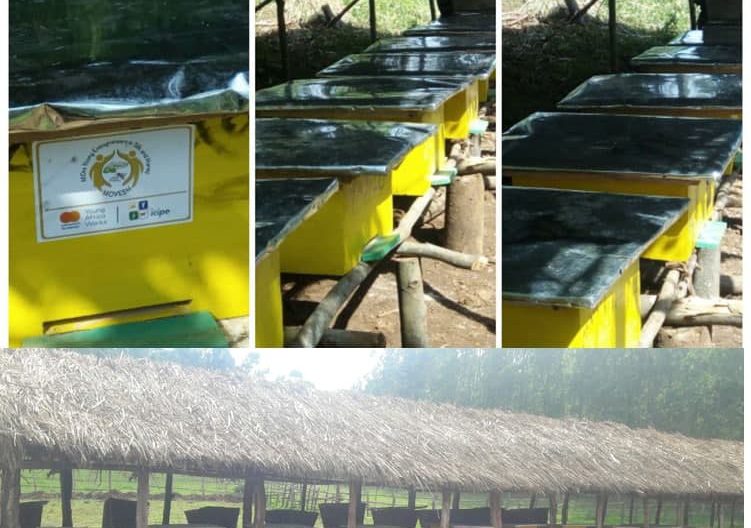
To have job is basic thing but having job and adding value via linking chain and making it more important is unusual in Ethiopia to benefit various segments of the society and building the economy. However, Ethiopia is a country encounters significant unemployment that affects young people especially hard.
Youth unemployment rates are four times higher than the rates among adults, and particularly high among females. Considering this challenge, the government has been undertaking activities that reduce unemployment working with various national and international development actors but still youth unemployment is a serious thing that needs to be addressed effectively because it has a potential to foster the country’s development trajectory.
Considering this challenge, International Centre of Insect Physiology and Ecology (ICIPE) in partnership with the Mastercard Foundation, the Ethiopia Jobs Creation Commission and several other public and private sector partners embarked on a programme with the title “More Young Entrepreneurs in Silk and Honey (MOYESH)’’ to contribute to the government efforts reducing youth unemployment in the country.
The goal of the programme is to “secure dignified and fulfilling direct employment and income for 100,000 unemployed youth of which 60 percent are women” through providing the youth with appropriate knowledge and skills and enabling them to establish beekeeping and sericulture business enterprises.
Concerning this programme, The Ethiopian Herald has assessed the performance of this project in Oromia State. Accordingly, MOYESH Programme that has been under implementation in the State has been producing remarkable results which benefited the participating youth enterprises and the society, Oromia region MOYESH programme manager accentuated.
Teshome Kumela, the MOYESH Programme Regional Manager for Oromia told The Ethiopian Herald that “This is a five-year programme. Now we perform well under prevailing challenges of the COVID-19 pandemic and occasional security concerns. Our plan is to reach out to 6,000 youths in both apiculture and sericulture businesses this year. So far 5,800 unemployed and interested youths were recruited, which means almost 98 percent of our target plan was achieved.”
There are sideline businesses like nursery programme, honeybee colony multiplication and selling, collecting crude honey and selling it to processers on top of running irrigation activities. The programme targets enabling 100,000 Ethiopian youth to secure dignified and fulfilling direct employment along with beekeeping and sericulture value chains across the country, in the regions where the programme has been going operational. This target contributes significantly towards alleviating the heavy youth unemployment challenge in Ethiopia, including the Amhara region.
The programme further will have positive impact on 14.6 million people along with the honey and silk value chains through multiplier effects. MOYESH is a five-year programme (October 2019-October 2024) implemented by ICIPE (International Centre of Insect Physiology and Ecology) in partnership with Mastercard Foundation and several private and public sector institutions in four regions of Ethiopia such as Amhara, Oromia, Southern Nations, Nationalities, and Peoples’ (SNNP) and Tigray.
“Of this, in Oromia alone, the project targeted to reach 44,000 unemployed youth in 10 woredas of Oromia region which has got 600 newly established cooperatives. All the enterprises have commenced the production of crude honey, silkworm cocoons, farm produce using the 300 hectares of land provided from the government,” the director remarked.
Adding, he said that MOYESH is investing on enterprises to enable them establish their businesses in either improved beekeeping practices or silkworm farming. Successful enterprises can progress further to establish marketing cooperatives or unions that can export and import products.
He further said: “Now we have provided them with beekeeping accessories like frame hives and honeybee colonies. For an enterprise with 10 members, MOYESH provides them with 20 frame hives, 20 honeybee colonies, 20 beekeepers’ protective clothing and veil and various hive tools. The youths match this investment with their contribution in the form of 20 traditional hives, 20 honeybee colonies and 20 transitional hives. Hence, each MOYESH programme youth enterprise can commence beekeeping activities with 60 beehives. For the implementation of this programme, the Mastercard Foundation has invested 55.6 million USD at national level.”
Asemamo Taye is one of the beneficiaries of the programme. He is a member of Birbirssa enterprise found in Yayu Woreda, Geri village, formed by membership of 11enterprenures. While approached by The Ethiopian Herald, he said: “MOYESH is assisting us. It has provided us with modern hives, tools and vital technical trainings to enable us start beekeeping as a major business along with complementary sideline businesses that can serve us generate additional income. Now our enterprise has commenced supplying honey to the market. In this regard, we are successful but our major plan is to grow into a cooperative union. We request the government to guide us to grow further and expand our business.”
Mehammedteha Abafita Head of the Jimma Zone Livestock Resource Development Department for his part explained how they work in collaboration with various actors to realize development outcomes that benefit the society through creation of decent jobs for the unemployed youth and generation of income for the enterprises.
BY MULATU BELACHEW
The Ethiopian Herald May 26/2021





